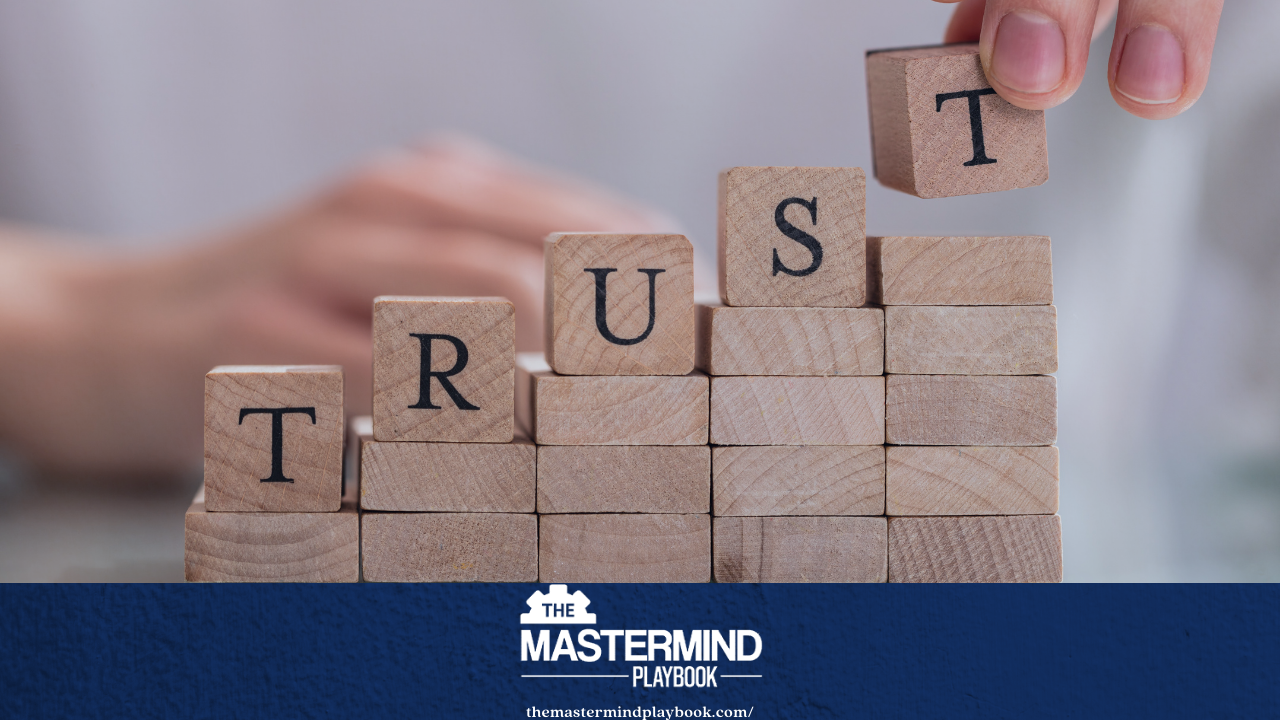Why You Should Cultivate Trust Among Your Mastermind Members

Trust forms the foundation for meaningful interpersonal relationships and organizational cohesion. Individuals who trust each other form bonds, cooperate, and work harmoniously towards a common objective. Conversely, a lack of trust between individuals causes power struggles, selfishness, and bitterness. As a result, individuals who don’t trust each other are less productive, less moral, and less motivated. This is not the outcome any of us want for our relationships!
This same dynamic also applies to groups. In fact, the effects of distrust become amplified when it comes to collectives and organizations. That is because a lack of trust amongst individuals in a group can lead to a culture of distrust which fosters infighting, ego gratification, and aggression. Thus an unhealthy environment breeds greater toxicity. This isn’t always the case, but it’s definitely the norm.
In this sense, you can consider the culture of a group or organization as an economy of trust, in which good faith and confidence in others within the group acts as the primary commodity. This commodity of trust doesn’t exist automatically and instead needs to be earned. As more trust is built, the group becomes more transparent, effective, and persuasive.
The trust economy can even extend outside of the group. This is particularly important for businesses that are working to gain the trust of potential customers.
If this concept of a trust economy sounds familiar, that is because it was discussed extensively in Stephen Covey's book The Speed of Trust.
Cultivating Trust as a Mastermind Leader
As a mastermind leader, your success in leading your group will be largely determined by your success in creating a prosperous economy of trust amongst your group members. If you fail in this, then other aspects of leading a mastermind become irrelevant.
Moreover, your mastermind leaders will be able to apply this ability to create trusting relationships with their businesses and personal pursuits. Trust increases the speed and efficiency of a business, making it more productive and even more affordable. This is because many of the most expensive and time-consuming aspects of running a business come from a fundamental lack of trust.
In fact, distrust is the norm in many businesses, making it necessary for leaders to form complex layers of bureaucracy, checks, and balances, and hierarchies to meet goals. However, businesses that are built on a strong foundation of trust can forgo or minimize many of these layers of bureaucracy.
Check out The Mastermind Playbook for more information on how trust can increase the speed and effectiveness of an organization.
The Trust Economy
Create a strong trust economy in your mastermind group and watch yourself and the members reap the benefits. Not only will your individual business pursuits grow, but even your personal lives! As an added benefit, trust will eliminate friction within your mastermind group, and make the meetings more beneficial for everyone involved.
The first step in creating an economy of trust is learning to trust yourself. Trusting yourself means staying true to your goals, principles, and values. Individuals who trust themselves always have integrity. In The Speed of Trust, Covey defines integrity as the ability to be completely honest, even when you’ve made a mistake.
In this sense, the foundation of integrity is the ability to be vulnerable when it comes to your flaws and shortcomings. I rarely see this vulnerability in the world of business. Those who embrace it will become far more trustworthy than average. Plus, as a mastermind leader, embracing vulnerability in yourself and in your members will enable all of you to grow.
How does one cultivate trust within their mastermind group? Here are a couple of thoughts:
By the way, check out The Mastermind Playbook for more on the importance of vulnerability when leading a mastermind group.
- Be impeccable with your word
To grow an economy of trust, you need to earn the trust of your mastermind members. Sounds obvious enough, right?
You will never persuade your members to trust each other if they don’t trust you. This is especially the case since as the facilitator, you are the individual that has brought them all together. You are the main point of contact in the group from which trust can flow.
In order to earn the trust of your members, you must be impeccable with your word. You should never lie to your mastermind group. Instead, you should be truthful and upfront about your positive intentions for forming the group and bringing all of these individuals together.
Demonstrating good intentions is an important part of earning trust. Your members should never suspect that you have an ulterior motive for facilitating the group such as money or social status. This is why it is so important that you make your true intentions known.
Check out The Mastermind Playbook for more tips on how to prove yourself as a trustworthy mastermind leader.
- Be Honest with Yourself
Being honest with your members is a necessary first step, but equally important is honesty with yourself. You need to understand your own capacity and limitations. As a leader, it can be tempting to deceive yourself into thinking that you can do more than you can. However, you never want to make promises to your members that you can’t keep.
Some mastermind leaders make the mistake of trying to talk people into joining their mastermind group by guaranteeing unrealistic results. This is a perfect recipe to lose the trust and confidence of your members.
Putting this into practice for your group may require some backtracking. Determine whether you’re being intentional with yourself, vulnerable to the group, and whether or not they trust you. Have an open and candid conversation about it, and invite everyone to chime in. Then, make a practice of honesty and vulnerability. The rest of the group will soon follow, enabling everyone to grow individually and collectively.
Check out The Mastermind Playbook for specific insights into how to recruit new members with integrity.

